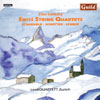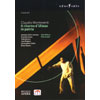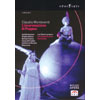20th Century Swiss String Quartets
Drama aplenty here, crowned by Audi’s splendid Poppea
View record and artist detailsRecord and Artist Details
Composer or Director: Hans Schaeuble, Meinrad Schütter, Erich Schmid
Genre:
Chamber
Label: Guild
Magazine Review Date: 11/2005
Media Format: CD or Download
Media Runtime: 57
Mastering:
Stereo
DDD
Catalogue Number: GMCD7303

Tracks:
| Composition | Artist Credit |
|---|---|
| String Quartet |
Hans Schaeuble, Composer
Bernard Delétré, Plutone, Bass Cyrille Gerstenhaber, Euridice, Soprano Delphine Gillot, Proserpina, Soprano Estelle Kaïque, Messenger (Silvia), Soprano Hans Schaeuble, Composer Kobie van Rensburg, Orfeo, Tenor Philippe Jaroussky, Speranza, Soprano Philippe Rabier, Apollo, Tenor Zurich Casal Quartet |
| String Quartet No 2 |
Meinrad Schütter, Composer
Arnold Van Mill, King Marke, Bass Birgit Nilsson, Isolde, Soprano Birgit Nilsson, Isolde, Soprano Birgit Nilsson, Isolde, Soprano Ernst Kozub, Melot, Tenor Fritz Uhl, Tristan, Tenor Hannelore Bode, Eva, Soprano Meinrad Schütter, Composer Regina Resnik, Brangäne, Mezzo soprano Tom Krause, Kurwenal, Baritone Zurich Casal Quartet |
Composer or Director: Claudio Monteverdi
Genre:
DVD
Label: Opus Arte
Magazine Review Date: 11/2005
Media Format: Digital Versatile Disc
Media Runtime: 176
Mastering:
Stereo
Catalogue Number: OA0926D

Tracks:
| Composition | Artist Credit |
|---|---|
| (Il) Ritorno d'Ulisse in Patria |
Claudio Monteverdi, Composer
Adrian Thompson, Eumete, Tenor Alexander Oliver, Iro, Tenor Anthony Rolfe Johnson, Ulisse, Tenor Baroque Ensemble Brian Asawa, Anfinomo, Alto Brian Asawa, Human Frailty, Soprano Christopher Gillett, Pisandro, Tenor Claudio Monteverdi, Composer Diana Montague, Minerva, Soprano Glen Wilson, Conductor Graciela Araya, Penelope, Soprano Jaco Huijpen, Antinoo; Time Monica Bacelli, Melanto, Soprano Monica Bacelli, Fortune, Soprano Toby Spence, Telemaco, Tenor |
Composer or Director: Claudio Monteverdi
Genre:
DVD
Label: Opus Arte
Magazine Review Date: 11/2005
Media Format: Digital Versatile Disc
Media Runtime: 219
Mastering:
Stereo
Catalogue Number: OA0924D

Tracks:
| Composition | Artist Credit |
|---|---|
| (L')Incoronazione di Poppea, '(The) Coronation of Poppea' |
Claudio Monteverdi, Composer
(Les) Talens Lyriques Brigitte Balleys, Nerone, Soprano Christophe Rousset, Conductor Claron McFadden, Valetto, Soprano Claudio Monteverdi, Composer Cynthia Haymon, Poppea, Soprano Elena Fink, Fortune Harry van der Kamp, Seneca, Bass Heidi Grant Murphy, Drusilla, Soprano Jean-Paul Fouchécourt, Arnalta, Contralto (Female alto) Mark Tucker, Lucano, Tenor Michael Chance, Ottone, Mezzo soprano Nathan Berg, Mercury, Baritone Ning Liang, Ottavia, Soprano Romain Bischoff, Lictor, Baritone Sandrine Piau, Damigella, Soprano Sandrine Piau, Damigella, Soprano Sandrine Piau, Love, Soprano Sandrine Piau, Love, Soprano Sandrine Piau, Damigella, Soprano Sandrine Piau, Love, Soprano Wilke te Brummelstroete, Pallas, Soprano Wilke te Brummelstroete, La Virtù, Soprano |
Author: David Vickers
There are contradictory ideas about how L’Orfeo would have ended when it was first performed in 1607: Striggio’s libretto follows Ovid with Orfeo bitterly renouncing women, provoking the offended Bacchantes to tear him to pieces, but the only known sources of Monteverdi’s music instead end with Orfeo ascending to heaven with his father Apollo. In a rather dry interview, Malgoire suggests that the altered ending promoted the Counter-Reformation theology of eternal salvation. Thus in this performance Apollo is dressed like an archbishop, with mitre and crook, but after he ascends Orfeo is left behind and brutally killed by the Bacchantes anyway. This self-conscious ambiguity creates an identity crisis at the close of an otherwise no-frills production (although I also failed to appreciate why Malgoire divides La Musica’s role between three sopranos).
Pierre Audi’s painstakingly designed productions are anything but natural: each gesture, movement and glance is meticulously planned. Some might squirm with cynicism when they hear Audi, in the accompanying documentary, calmly insist that Monteverdi is the closest experience in opera to Shakespeare, but Audi’s slow and stylised action constantly reinforces the dramatic power of situations. This total concentration forces the drama slowly to ripen and intensify to bursting-point. Audi’s Il ritorno d’Ulisse is a masterpiece of controlled timing and patience, leading towards the explosive moment when Ulisse exacts his vengeance upon the vile men who have pestered Penelope. Graciela Araya’s Penelope sheds real tears while maintaining a dignified stage presence. Few tenors can match Anthony Rolfe Johnson’s ability to deliver vocal beauty with authority (this 1998 performance shows him still at his best).
Glen Wilson’s performance version‘ makes absolutely no pretensions to definitiveness or scholarly solidity’ by making considerable cuts and reordering the score. Most of the secondary scenes not based on Homer are omitted; but the performance might appeal to purists because Wilson refuses to orchestrate Monteverdi’s sparse scoring and prefers to keep to a continuo-based approach instead of adorning the music with false and inauthentic lushness.
Christophe Rousset claims to have made ‘as few cuts as possible’ in L’incoronazione di Poppea but makes a few compromises by adding recorders, cornets, harp, viola da gamba and organ. This splendid performance is probably more sumptuous than what Venetians heard in 1642. Audi is a little more subversive with Poppea. For example, Lucano and Nerone’s duet in praise of Poppea’s charms is staged as a homosexual relationship. It is not in the libretto but the implication that Nerone will be no more loyal to Poppea than he has been to his wife Ottavia certainly fits the most unpleasant character in an opera full of phenomenally dislikeable people.
There are also some illuminating touches: Audi persuades us that Ottone comes to return Drusilla’s devoted love when they are banished for a failed attempt to assassinate Poppea; the noble Seneca clearly comes across as the moral hero of the opera. There are a handful of spectacular visual effects, sparingly reserved for divine intervention. It is difficult to imagine the music being better sung: Michael Chance and Harry van der Kamp are impressive, but there is no weak link here, as one would expect from a cast in which Jean-Paul Fouchécourt, Claron McFadden, Sandrine Piau, Wilke te Brummelstroete and Nathan Berg are assigned secondary roles.
Discover the world's largest classical music catalogue with Presto Music.

Gramophone Digital Club
- Digital Edition
- Digital Archive
- Reviews Database
- Full website access
From £8.75 / month
Subscribe
Gramophone Full Club
- Print Edition
- Digital Edition
- Digital Archive
- Reviews Database
- Full website access
From £11.00 / month
Subscribe
If you are a library, university or other organisation that would be interested in an institutional subscription to Gramophone please click here for further information.




